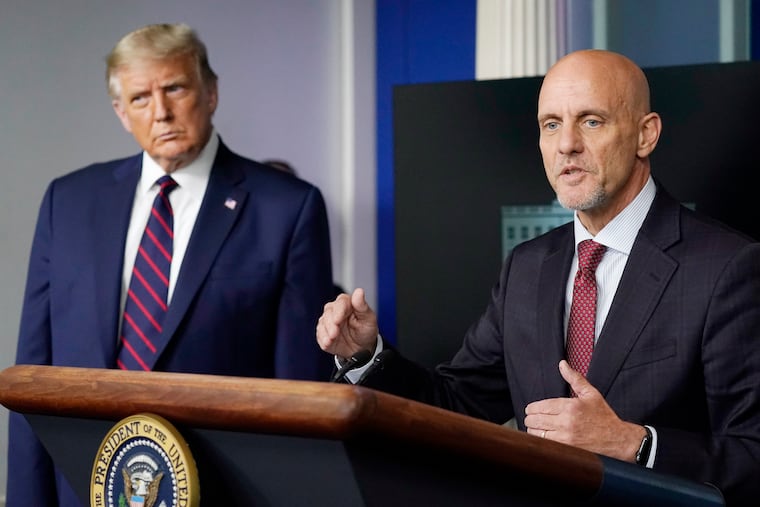Trump announces plasma can be used for COVID-19 on emergency basis
The announcement came on the eve of the Republican National Convention.

Calling it a “very historic breakthrough,” President Donald Trump announced an emergency authorization Sunday for doctors to treat COVID-19 patients with plasma: the liquid portion of blood donated by people who already have recovered from the disease.
The move was made by the U.S. Food and Drug Administration, which had held off on doing so earlier this month amid uncertainty about whether the treatment was beneficial.
As on other occasions during the U.S. response to the pandemic, questions of science were overshadowed by accusations of politics. Without any evidence, the president suggested the FDA’s delay had been an attempt to hinder his chances in the Nov. 3 election. Critics countered that the opposite was true: that the president had pushed the agency to cut corners, acting faster than it normally would in order to boost his political fortunes on the eve of the Republican National Convention.
Politics aside, the reality is that plasma is a low-risk approach that has been used to treat infectious diseases for more than a century, such as in a 1934 outbreak of measles at the Hill School in Pottstown. The evidence that plasma may help COVID-19 patients is preliminary, but many physicians have nevertheless embraced it as a plausible therapy for those who suffer severe symptoms of the coronavirus.
That’s because donated plasma contains antibodies: proteins that the donor’s immune system made to fight off the virus. Antibodies remain in a person’s blood even after recovery, so in theory they can be transferred to sick patients whose immune systems have yet to make the proteins — giving them a head start in fighting the disease.
But there are caveats. The levels of antibodies vary from donor to donor, and some flavors of these proteins are more effective at neutralizing the virus than others. That is why scientists have pushed for randomized trials — carefully controlled studies in which some patients are randomly selected to receive precise amounts of antibody-laden plasma, while others get a placebo. Only then could researchers nail down exactly how much the drug contributed to patient recovery.
Critics said the FDA’s move to allow emergency use of plasma could make it harder for scientists to compare patients who get the treatment with those who do not, because everyone would want it.
» READ MORE: A Pennsylvania doctor used plasma to stop a virus outbreak -- in 1934
Among them was Harvard physician Ashish Jha, the incoming dean of the Brown University School of Public Health, who voiced concerns in a tweet Sunday before Trump’s announcement of the emergency use authorization (EUA).
“I‘ve been optimistic about convalescent plasma as therapy,” Jha said. “But optimism isn’t science. We need results of adequately powered randomized trials. Issuing an EUA without it would make such trials harder. And erode the credibility of the FDA. And ultimately, harm people with COVID.”
Eric Topol, founder and director of the Scripps Research Translational Institute in La Jolla, Calif., was more blunt, tweeting that FDA commissioner Stephen Hahn had “caved to Trump’s pressure,” falsely promoting the use of plasma as a breakthrough.
Hahn, who joined the president at the news briefing Sunday, called the treatment “promising” but did not respond to a media question about whether he had been pressured to authorize it. He urged those who have recovered from COVID to sign up to donate plasma at coronavirus.gov.
Earlier, Trump reiterated his claim that some in the FDA and the department of Health and Human Services had wanted to move slowly on plasma for “political reasons” — a serious accusation to make about agencies staffed with career scientists. The president acknowledged wanting regulators to move quickly and cut through “unnecessary barriers,” but said his own motives were free of politics.
“I think that there might’ve been a holdup, but we broke the logjam over the last week,” he said. “This has nothing to do with politics. This has to do with life and death.”
The largest study of plasma in COVID-19 patients is being conducted by researchers at the Mayo Clinic, Johns Hopkins University, and other institutions. It is not a randomized study, and thus falls short of the “gold standard” of scientific evidence, but includes data on thousands of patients who have received plasma at hospitals across the country. Among them are more than 50 patients treated at the Virtua Health network in South Jersey.
So far, patients who received plasma within three days of diagnosis have been more likely to survive than those who got it at least four days after diagnosis — though the results have yet to be published in a medical journal. And patients who received plasma with higher “titers” of antibodies fared better than those who got plasma with lower levels of the immune-system proteins.
Eric Sztejman, medical director for Virtua’s intensive care units, agreed that a randomized trial would constitute stronger evidence, but nevertheless said the results in patients under 80 were encouraging.
“The study suggests that if you transfuse plasma early with a high antibody titer, these patients may do well,” he said.
Virtua has been treating patients with plasma since April, when answers for COVID were scarce.
“What was really important was giving the patients a chance,” Sztejman said. “We felt that this was a safe way to do it. I personally felt we needed to give them something.”